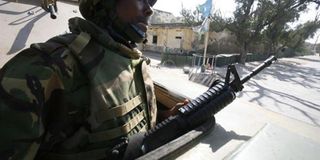We must never fall into terrorists’ trap by turning against one another

A Kenya Defence Forces officer on patrol in Kismayu town on January 21, 2014. FILE PHOTO | EVANS HABIL |
What you need to know:
- Al-Shabaab have us where they want us. They wanted us to live in fear.
- The need for self-reflection cannot be overemphasised.
The deadly terror attack on Garissa University College has been roundly condemned.
The Kenya Defence Forces have reportedly responded with air strikes on Al-Shabaab hideouts in Somalia. Students have demonstrated in the streets as parents try to come to terms with the senseless death of their children. Northern Kenya leaders have urged the government to shut down the Dadaab refugee camp.
Kenya is angry, very angry. Harbouring thoughts of hatred, revenge, bitterness, disillusionment, despair, or even xenophobia is normal in such circumstances.
However, we must not allow ourselves to fall into the trap of the terrorists. We must at all costs resist falling victim to xenophobia and pandering to the wishes of Al-Shabaab.
In our current state of panic, we are already pandering to Al-Shabaab. Shutting down the Dadaab camp would be self-defeating because we would end up ostracising people who fled Somalia for fear of Al-Shabaab.
We would be telling the genuine refugees that we do not care about their fate and inadvertently giving them incentive to get radicalised and return to harm us.
Al-Shabaab have us where they want us. They wanted us to live in fear. They wanted us to start doubting our resolve to obliterate them and start looking at issues from their perspective. They wanted us to be so desperate that we would pander to their wishes. They wanted us to hate one another and turn xenophobic.
Disillusioned Kenyans are suggesting that our troops get out of Somalia because Al-Shabaab want us out. Others have suggested building a perimeter fence along the 700 km border. Yet others have adopted “self-reflection” to explain the root causes of terrorism and how we might have brought it upon ourselves. Blame the victim, right?
WRONG ISSUES
The need for self-reflection cannot be overemphasised. However we are expending a lot of energy and time focusing on the wrong issues.
First, Al-Shabaab did not invite KDF to Somalia and cannot, therefore, dictate the KDF/Amisom exit schedule.
Secondly, building a fence along the common border is comical, if not outrageous. We all know that Al-Shabaab no longer needs to send its killers from Somalia because they are already well established inside Kenya.
Third, and most important, is the misplaced notion that Al-Shabaab is raising legitimate concerns. Political or social injustices inside Somalia cannot and should not be Kenya’s fault. However genuine their concerns, killing an English literature major from Kakamega will not resolve the political impasse in Mogadishu, Sana’a, or Kandahar.
Our message to Al-Shabaab or whoever else shares in their “wisdom” should read like this: “We are not going to negotiate as long as you use terrorism. Even if you have legitimate grievances but continue using terrorism, we will simply not listen to you. We will not try to understand you and we most certainly will not change our way of life and policies to suit you. Instead we will hunt you down, chase you to the gates of hell, and destroy your networks.”
Some may argue that such a hard-line position is counterproductive, but can it get any worse than the killing of 142 innocent students? Terrorists are not ordinary criminals who can be rehabilitated. They are hardened zealots who inflict premeditated and goal-oriented pain. They are driven by ideology and states will never win the war against an ideology with velvet gloves and pandering to those who seek to maximise casualties.
There is no one-size-fits all-solution to a threat of this magnitude. However, we must leave our options open. One, we cannot be xenophobic. Two, we must infiltrate Al-Shabaab and control their propaganda. Three, we must monitor terrorism suspects around the clock and, if necessary, intercept their communication.
Four, we must restrict movement of Somali refugees in Kenya by imposing periodic reporting requirements, collectively punish corrupt border point officers, hold imams responsible for all activities at their respective mosques, conduct pre-emptive strikes, enhance strategic training, and execute targeted elimination as long as we have actionable intelligence. This way, the Garissa 148 will not have died in vain.
Mr Kaberia is an assistant director of international programmes at the University of the District of Columbia, Washington DC. [email protected]




